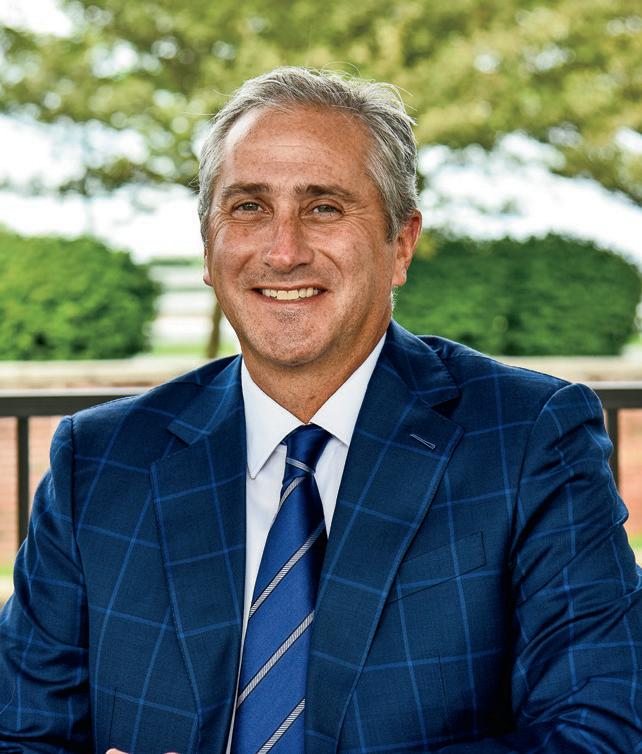

Market Muddle
Investors continue to navigate volatility amid recession talk and conflicting economic forecasts. Experts say they should be fine if they avoid greed and fear.
By Andrew KingAs the world emerges from a oncein-a-lifetime pandemic and grapples with the ongoing war in Ukraine, investors are dealing with the fallout of a roller-coaster few years in financial markets. Inflation has been a hot topic for months, while talk of an upcoming recession has been a theme since the height of the pandemic. After cratering markets in 2020 and a bounce-back in 2021, 2022 saw yet another dip.
It’s not easy to pin down exactly where markets are headed, how inflation will look a year from now or whether we’re in for a recession. In December, Fortune predicted that the U.S. will avoid a recession, while Deutsche Bank forecasted the opposite.
So what do investors see coming? How are they navigating volatility under these uncertain conditions? Even for Joseph Chornyak Sr., a financial planning consultant at Chornyak & Associates with more than 40 years of experience under his belt, it’s hard to be sure.

“I talk to portfolio managers and economists on a regular basis, and with rare exception, the consensus is that this market today is ahead of itself,” he says. “It’s a bit pricey today, and it’s priced for perfection. We all realize that perfection isn’t necessarily reality. So there are a lot of things that are a bit uncertain.”
Mark Beaver, senior financial ad -
viser and partner at Dublin’s Keeler & Nadler Family Wealth, says much of the uncertainty comes from a volatile two years. After a comeback year in 2021, he saw too much optimism and excessively lofty expectations. Following a down 2022, expectations were so low that he had to try to lift clients’ hopes. But that’s improved in early 2023, though people have remained generally pessimistic.
And trends aren’t equal across all areas, either. For instance, although there are fears over inflation and other factors, Beaver says we “haven’t seen bonds look as good as they do right now in more than a decade.” Meanwhile, “nobody” wants to invest internationally
because those investments have been underperforming versus their domestic counterparts.


Peyman Salehi is the managing director of Wealth and Asset Management for Cincinnati-based Fifth Third Bank. His clients’ portfolios are largely designed for long-term investors and concentrated on preparing them to handle short-term effects with a long-term strategy. They aim to be less reactive, with fewer quick-turn adjustments.
But Salehi says the bank does anticipate a “mild recession” in the next 12 months, though he cautions that it is unlikely to be “aggressive” and says he expects a “soft or medium landing.” And for Salehi and Fifth Third’s clients, he says the key will be to understand that in spite of all the uncertainty, it’s rare to find a truly unique scenario. So sticking to longheld principles is paramount.
“We have to keep reminding clients that these events have happened throughout all investment cycles all through history,” he says. “The key is to build all-weather portfolios that can withstand these things. We can’t

control these events, but we can build portfolios that withstand them as best as possible. That’s really the key to this. … Trying to guess what will come down the pike is great, but building a portfolio that can endure it no matter
what is important.”
That focus on prioritizing long-term strategy over short-term plays is the one view consistent among just about everyone in the industry. For those with solid, long-term strategies, a market like 2023’s may not even make much of a difference.
“If you’re a long-term investor and you’re dealing with your long-term, serious money that you don’t need for the next two or three years, this is a non-event,” Chornyak says. “Stay invested and ride through the storm. One thing that I’ve learned over the years is that nobody has the crystal ball to know exactly when to get in or to get out. Markets go down temporarily, and they go back up and hit new highs. It’s important to be patient as an investor.”
And at a time when “uncertainty” has become the main theme, Beaver cautions against reaction of almost any kind. In the moment, he says, it can feel necessary. But in reality, it often creates more problems than benefits, and there’s no guarantee that what you’re reacting to will even be a correct read of the moment.
“There’s no neon sign flashing at us that says, ‘Hey, you’re in the middle of a recession right now... Usually the bureau of economic research comes out six to 10 months later to tell us that, and by then the market has bounced 20 percent, so you’re too late.”
Mark Beaver, senior financial adviser and partner at Dublin’s Keeler & Nadler Family Wealth
“There’s no neon sign flashing at us that says, ‘Hey, you’re in the middle of a recession right now,’ ” he says. “Usually the bureau of economic research comes out six to 10 months later to tell us that, and by then the market has bounced 20 percent, so you’re too late. A lot of the conversation last year was, ‘Are we in a recession?’ and here we are 18 months later, and it’s still the question.”
Two things that can destroy a good long-term plan are the textbook red flags in investment: greed and fear.
“When the markets are going up, there’s a tendency for individuals to be afraid that they’re missing out, so they jump in,” Chornyak says. “At the opposite end, when markets start to have a pullback, people go into panic mode and worry that they’ll lose everything. So fear sets in, and they pull everything. Every investment textbook that’s ever been written says you should buy low and sell high, but invariably investors let greed get in the way and buy high or let fear get in the way and sell low.”
It can be easy for clients—or advisers—to say that they won’t be affected by either. But in Beaver’s experience,



most people don’t know how to frame their fear or greed in the moment. The challenge is that a client might not even know, truly, what their tolerance is, and it changes all the time.
Salehi says Fifth Third’s investment strategies are more designed for the long-term, which helps avoid the temptations of both greed and fear. He says the key to avoiding both is to come to an understanding with a client about what they want their money to do. With some firms, a client can ask for the “stock of the day,” but Fifth Third’s investment strategies aren’t built that way, which means they can tell clients, with confidence, that they’re in it for the long haul.


“Hopefully we can temper both the greed and the fear with a thoughtful investment strategy,” he says.

and based solely on the disclosed criteria.



